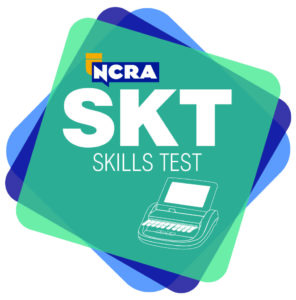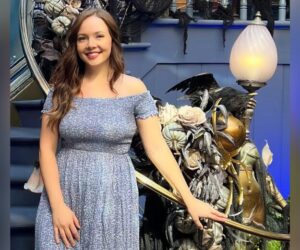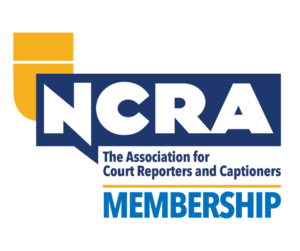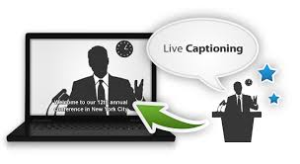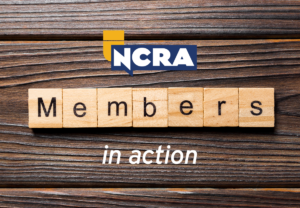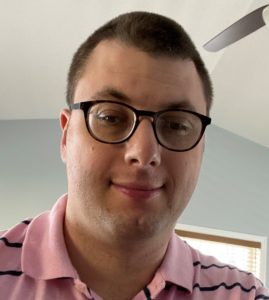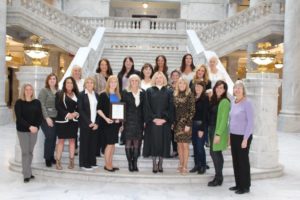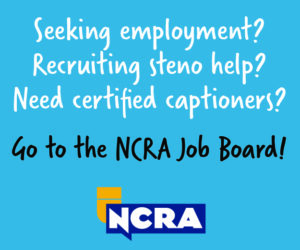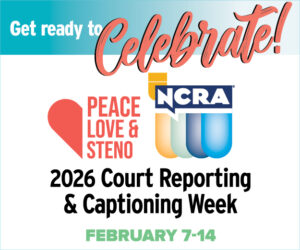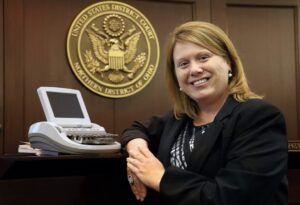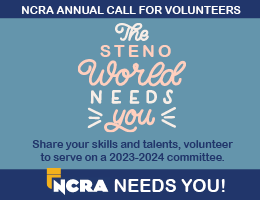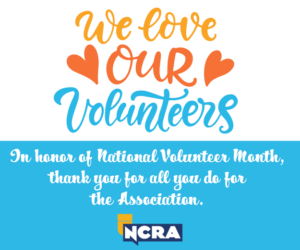NCRA would like to thank those members who have graciously volunteered their time to caption events ranging from Town Halls with the president to the numerous webinars the Association has made and continues to make available to members. Here’s a special shout-out to those volunteers:
- Tina Dillon, RPR, CRR, CRC, Chicago, Ill.;
- Lisa Doyon, RPR, CRC, Eagle, Idaho;
- Kim Falgiani, RDR, CRR, CRC, Warren, Ohio;
- Patty Nelson, CRC, Annapolis, Md.;
- Anissa Nierenberger, RPR, CRR, CRC, CRI, Boise, Idaho;
- Sheri Smargon, RDR, CRR, CRC, Riverview, Fla.;
- Angie Starbuck, RDR, CRR, CRC, Columbus, Ohio
- Carol Studenmund, FAPR, RDR, CRR, CRC, Portland, Ore.; and
- NCRA Director Heidi Thomas, FAPR, RDR, CRR, CRC, Kennesaw, Ga.
The JCR recently reached out to these volunteers to learn more about what motivates them to serve their association and fellow members. Tina Dillon told the JCR why she volunteers. Here’s what we learned from our other volunteers.
JCR | What motivates you to volunteer to caption for NCRA’s events and webinars?
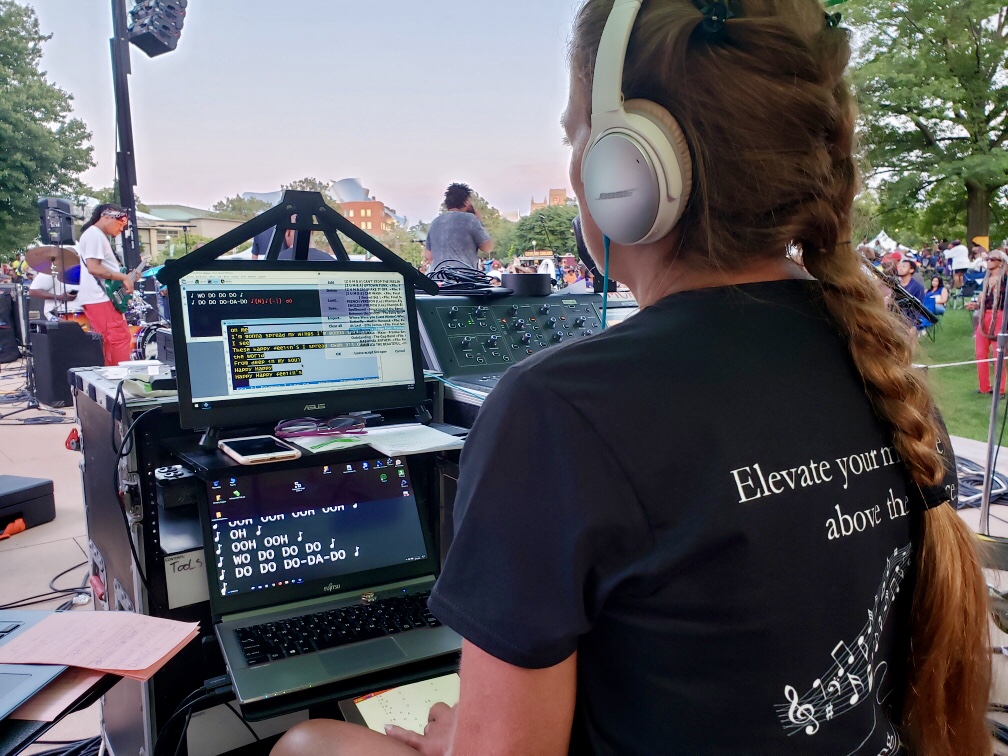
Kim Falgiani | The challenge of captioning before my peers is what motivated me initially. Once I volunteered and was a part of planning, I saw how much others contributed and wanted to continue being a part of all the hard work that goes into these events.
Anissa Nierenberger | To encourage others to volunteer for our national Association and to highlight the awesome career of captioning.
Sheri Smargon | I would love for other members of the Association to branch out and do something they may find terrifying, writing live in front of their peers. It’s a great way to promote the Association and show why we are the gold standard over other methods of taking down the record.
Angie Starbuck | I enjoy giving back to a profession and Association that has given me so much in my career. I have been a member since graduating from court reporting school, and I am honored to give back as a way to thank all of those people who have served NCRA over the years and helped shape me into the court reporter I am today.
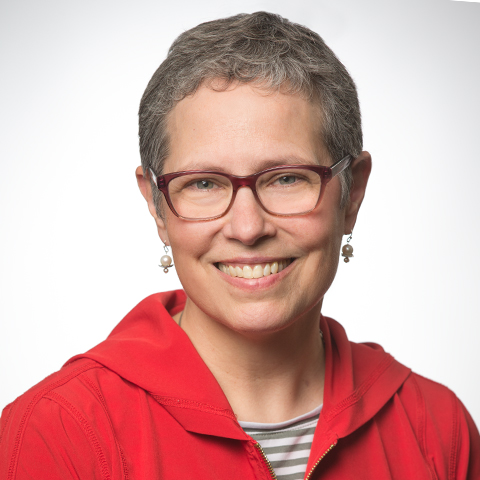
Carol Studenmund | I volunteer to caption for NCRA out of a love for our profession, the friends I have in this organization, and the need to bring more people into the profession
JCR | Why is it important to volunteer your time and skills to assist the Association?
KF | As a member, I have a responsibility to participate in NCRA. Not everyone is at a place in their careers where volunteering fits into their hectic schedules. If you can find the time to volunteer, then go for it! You will have so much fun and overcome the trepidation of sitting before your peers and writing realtime.
AN | As a past president of the Michigan Association of Professional Court Reporters and after volunteering five years on the Board, I saw the benefits of volunteerism to boost up others so that we can all represent our industry as professionals. The same applies at the national level.
SS | The profession can only move forward in its advocacy and its mission of proving we are the gold standard for preserving the record as well as a channel of communication in the deaf and hard-of-hearing community if we all support it through our deeds and our words. When we showcase our skills, in whatever way we practice our profession, we bring awareness of the skill, professionalism, and dedication to people who may not realize we’re even there.
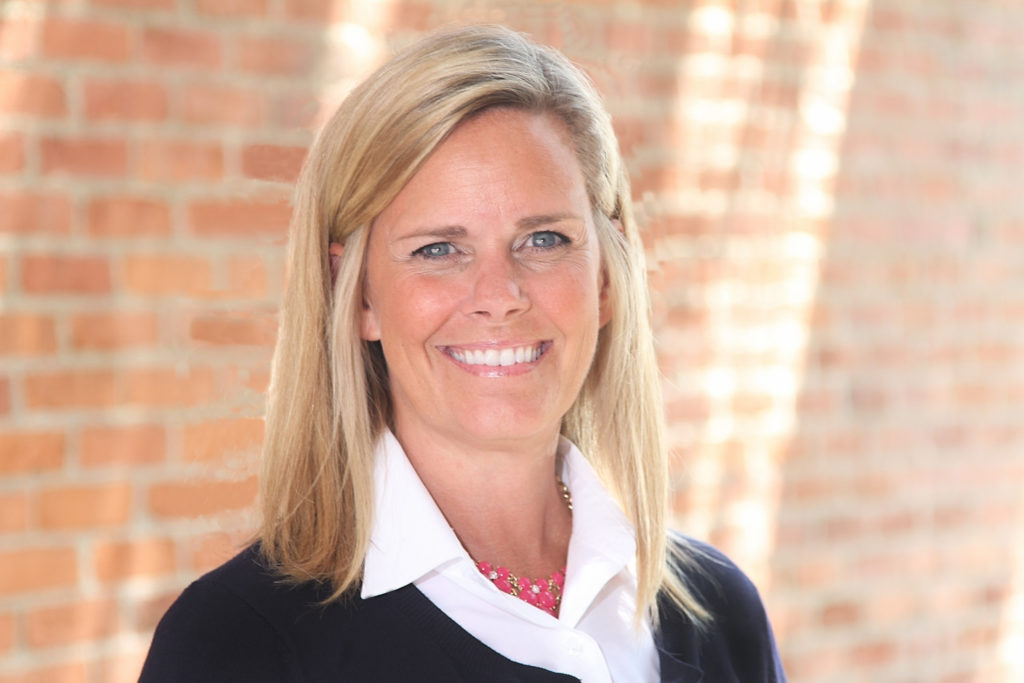
AS | An association needs its members as much as the members need the association. We wouldn’t be able to advance our profession without volunteers! If you want to see a change in your profession, you have to be willing to step up and volunteer. Getting involved in your association is the best way to make a positive impact for others in the court reporting and captioning field.
CS | I’m a big believer in organizations. I make friends; I learn about captioning; I spend time with people who understand what my work is.
JCR | What would you say to encourage others to volunteer their time to caption for NCRA events and webinars?
KF | For any captioners who may feel that they are not fully engaged in the organization, volunteering is a great way to get involved. Participation helps the Association promote captioning. It also fosters an appreciation for the work NCRA does to support court reporters and captioners alike.
AN | Don’t let self-consciousness hold you back! Thousands of people have already seen your captions, so go for it!
SS | When I volunteer within the Association, I honestly feel like I’m giving back to something that has given me so much. When you are able to pay it forward by donating your time, talent, and energy, you’re giving back. If this career has been good to you, it’s definitely something you should consider. You don’t have to live caption a Town Hall. You can serve on a committee that piques your interest. Are you interested in deciding what seminars are on tap for the next in-person convention? Join the Education Content Committee. Do you want to be part of writing the questions that appear on the certification exams? Join the WKT Committee. Do you like the thought of shaping where your profession is going and how your association is going to best represent you and what you need? Become a Board member. There are so many avenues within NCRA that don’t require you to be “live, on stage.” Our Association runs mostly through reporters willing to step up to the plate and volunteer.
AS | It’s a great feeling to volunteer your services, and it’s a way to help the Association by doing what we do best. Many times, captioners are so busy with families and their career that they may not have time to serve on a committee. This is a perfect opportunity to serve NCRA and its members without a large expenditure of your time!
CS | You will only grow in experience and knowledge but also in friendships when you volunteer for NCRA.
JCR | How long have you been a captioner?
KF | Eighteen years now, but I had a 22-year court reporting career first, both as an official and a freelancer.
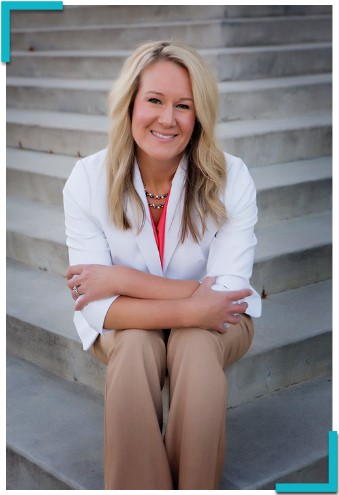
AN | I’ve been a captioner for 28 years!
SS | I have been captioning since 1992. I graduated court reporting school in February 1992 and began working for my local county government captioning the Board of County Commission meetings. The team I was a part of was the first county in the nation to open caption their government meetings. I think I’ve come a long way from the stage fright that caused, “You need to slow down. I think it’s coming up in Russian up there” to writing live for an NCRA Town Hall. I couldn’t have done that without the support and guidance my Association provides.
AS | I have been providing CART and captioning services since 1995. It is the most rewarding part of my job!
CS | Since 1992.
JCR | How did you hear about the profession?
KF | During my senior year in high school, I was involved in a Gregg Shorthand contest at a local business college. During that competition, we were shown the school. We were taken to a classroom where students were writing away on these strange machines. I inquired that day about the program, and I couldn’t be convinced to pursue any other career after that day.
AN | I sat in with a court reporter at a career day in high school, and I knew at age 14 that this was what I was meant to do.
SS | When I was a senior in high school, the local tech school presented at a career day. I had never heard of stenographer or court reporters, but it seemed mildly interesting. I am an incredibly bad procrastinator. I didn’t have the grades to get a scholarship into college, and I certainly couldn’t pay for it myself. And I knew if I didn’t do something after high school, I would end up doing nothing, so to speak. I would have no career and would just work an anybody-can-do-it job.
AS | My husband heard a famous radio advertisement in our city for “court reporting jobs going unfilled” back in 1990. He came home and told me I should check it out. I became a court reporter first and then was trained by my mentor, Linda Sturm, to provide CART and captioning. Here I am 30 years later still doing a job I love and working with amazing colleagues!
CS | My grandfather was a court reporter in Oklahoma in the 1910-1940s. I knew he made a very decent living through the Great Depression. Then a friend told me about the court reporting school here in Portland and how the classes were organized, and I thought I’d give it a try. It was a great match from the start.
JCR | What is the most interesting event you have captioned in your career?
KF | Earlier in my captioning years, I would have said the Tour de France without hesitation. But it’s difficult for me now to pick one since my remote broadcast captioning has expanded into on-site CART and open captioning. On-site CART for the Democratic National Convention in 2016 was very interesting, in the true sense of interesting. Traveling to Harvard to be a part of “Jagged Little Pill” was a joy. In fact, “isn’t it ironic, don’t you think” that I am scheduled on a virtual reception now with Alanis Morissette and the cast of “The Jagged Little Pill” in just a couple days? Those types of jobs among common captioning jobs make every day interesting.
AN | I’ve traveled to Menlo Park, Calif., numerous times and captioned Mark Zuckerberg at Facebook. I love tech captioning along with sports and anything that challenges me. Professional trainers and mentors got me to where I am now: Janet Cassidy-Burr, Larry Driver, Judy Brentano, Jen Schuck, FAPR, RDR, CRR, CRC, among others. I’m a very fortunate girl. I encourage all reporters/captioners to do something today that makes you better than you were yesterday.
SS | I have captioned a lot of interesting things. My first day on the air when I worked for VITAC was the Oklahoma City Bombing. Nothing like trial by fire. Sept. 11. There’s always good, bad, and indifferent when you’re captioning. I may have started my captioning day captioning a fluff tabloid show and ended the day by captioning hard-core national news.
I’ve captioned the Golden Globe Awards a couple times. I captioned the Stanley Cup Finals one year. “My” team wasn’t playing, so I didn’t have a dog in the fight. I used to love when I’d caption a show I’d watch anyway, like “The Voice” or “Saturday Night Live.”
I’ve captioned the Olympics eight times. There’s nothing like preparing for something “easy,“ like track and field, only to end up with soccer between two countries that you are almost sure are made up.
But no matter what I’m captioning, if possible I try to learn something from every event. I have learned to expect the unexpected and remember that I’m there to help someone understand. If I find myself wavering and getting annoyed with a job, I recenter and think about my Dad, and now Mom, who almost wholly rely on closed captioning to watch television. Would they be proud of the job I’m doing?
This profession gives back in so many ways, noticeable and unnoticeable. You just have to pay attention.
AS | There have been so many interesting things over the years: presidential commencement speeches, Big 10 football games, NHL hockey games to name a few. I would say my favorite was probably captioning an in-person Joe Rogan comedy show! My most proud (and most challenging) moment was being asked to provide on-site captions for one of the presidential debates in Ohio in 2019.
CS | It’s hard to pick between captioning onsite for the Dalai Lama and captioning for the stadium where the Seattle Seahawks won the Super Bowl.
If you are interested in captioning an NCRA event, please contact Laura Butler at lbutler@ncra.org.


